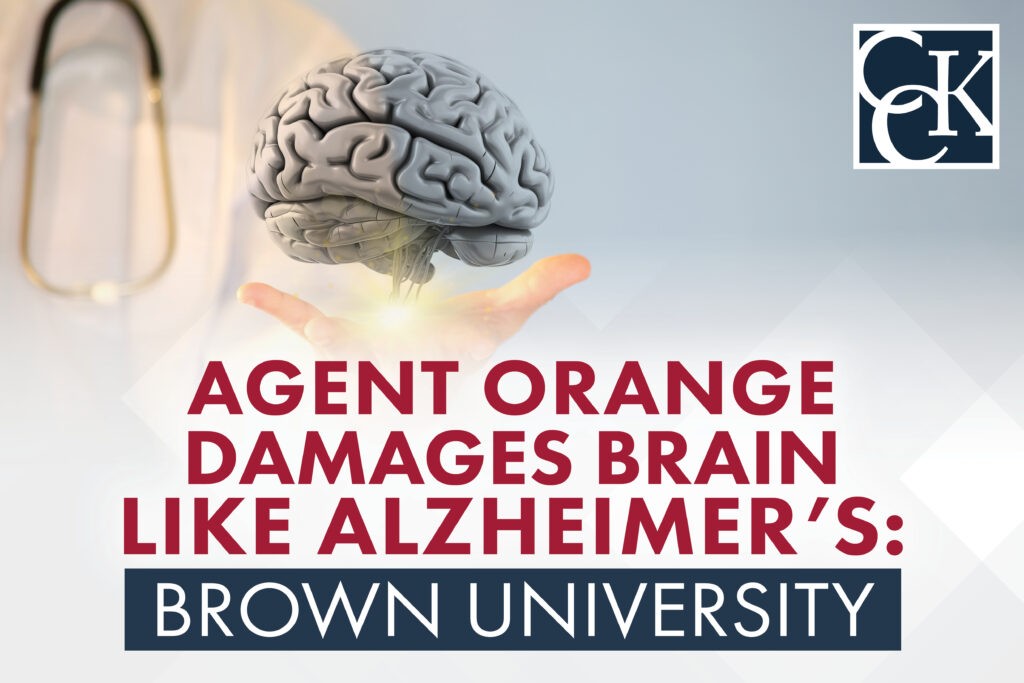Agent Orange Damages Brain Like Alzheimer’s: Brown University

CCK Law: Our Vital Role in Veterans Law
In February 2024, scientists at Brown University began publishing results from a study on Agent Orange and how it damages the brain. The study sheds light on the actual mechanisms Agent Orange uses to affect brain tissue and cause neurodegenerative diseases.
This information could prove extremely useful for veterans seeking to establish a connection between their exposure to toxins and diseases that they developed later in life. We will explore what Brown’s study revealed and how it may impact veterans who were exposed to these dangerous chemicals while in military service.
Understanding Agent Orange
Agent Orange is an herbicide that contains dioxin. It was used by the U.S. during the Vietnam War to spray foliage that enemy forces were using for cover. In 1971, the U.S. government prohibited its use. However, the chemicals that are in Agent Orange can remain for decades in the environment.

Agent Orange itself is comprised of two main herbicides: 2,4-dichlorophenoxyacetic acid and 2,4,5-trichlorophenoxyacetic acid. The toxins that constitute Agent Orange are also present in lawn fertilizers, and 2,4-D is commonly used to treat various crops, including corn, soybeans, and hazelnuts.
The authors of Brown University’s 2024 study stated that “the widespread, uncontrolled use of Agent Orange in herbicide and pesticide products is such that one in three Americans has biomarker evidence of prior exposure.” In other words, around 33 percent of Americans, including those who never served in the military, have evidence of Agent Orange exposure.
Agent Orange is associated with several debilitating medical conditions. Some of these conditions include diabetes, several types of cancer like bladder cancer, and Parkinson’s disease.
Brown University’s Agent Orange Study
The Brown University study used laboratory rats to test the effects of Agent Orange on brain tissue. The study found that frontal brain tissue developed molecular and biochemical abnormalities like those associated with early-stage Alzheimer’s disease. One potential outcome of this finding is that doctors may be better equipped to diagnose and intervene with the effects of Agent Orange exposure.
Furthermore, the research revealed an association between exposure to Agent Orange and high rates of dementia and the development of nervous system degenerative diseases. Before this study, scientists knew that Agent Orange was a neurotoxin and, consequently, had potential long-term effects. However, this study made this connection much clearer.
The connection may also have vital implications for veterans exposed to Agent Orange. The study author, Dr. Suzanna M. De La Monte, stated that if the research could show that Agent Orange leads to brain diseases, such as Alzheimer’s, then it could lead to veterans getting the help and support that they need.
Veterans exposed to Agent Orange could qualify for VA disability benefits by providing a medical diagnosis of a presumptive condition linked to Agent Orange and proof of service in a qualifying location during the specified timeframe. VA’s Agent Orange website details these conditions—including recent inclusions like hypertension and monoclonal gammopathy of defined significance added by the PACT Act—as well as eligible locations and timeframes. Yet VA may still deny your Agent Orange claim, or you may receive a VA rating with which you do not agree. If so, you can reach out to Chisholm Chisholm & Kilpatrick, the largest veterans law firm in the U.S. We have been helping veterans appeal their claim decisions and get the benefits they deserve since 1999, and we may be able to help you too. Call us today at (800) 544-9144 for a free case evaluation with a member of our team.VA May Deny Your Disability Claim for Exposure to Agent Orange
About the Author
Share this Post
